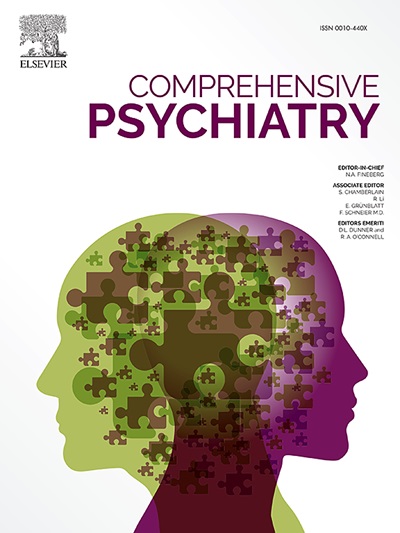Affective dysregulation and sex differences in somatic symptom disorder: A 6-month longitudinal and mediation analysis
IF 4.2
2区 医学
Q1 PSYCHIATRY
引用次数: 0
Abstract
Objectives
Somatic symptom disorder (SSD) is characterized by persistent physical symptoms and excessive emotional responses, but the influence of emotional factors such as anger and alexithymia on symptom severity and course remains unclear. This study examined whether baseline levels and six-month changes in emotional factors are associated with somatic symptom severity and course in SSD, considering sex.
Methods
Eighty-three SSD patients and 80 age- and sex-matched healthy controls completed self-report measures of emotional and somatic symptoms at baseline and six-month follow-up. Changes in symptom levels were compared between patients and controls. Emotional factors associated with symptom severity and change were also examined. Linear mixed models, multiple regression, and Bayesian mediation analyses were employed.
Results
Compared to controls, the SSD group showed significant improvement in somatic symptoms over six months. Trait anger was significantly associated with somatic symptom severity in females, and an interaction between anxiety and trait anger predicted symptom severity. Within the SSD group, reductions in anxiety and alexithymia were significantly associated with symptom improvement. Mediation analyses supported indirect pathways between affective change and symptom reduction.
Conclusions
This prospective study highlights the contribution of emotional dysregulation to both the severity and course of somatic symptoms in SSD. The findings emphasize the relevance of sex differences and emotion-focused mechanisms in symptom maintenance and improvement, supporting the need for tailored interventions in SSD treatment.
躯体症状障碍的情感失调和性别差异:为期6个月的纵向和中介分析
目的躯体症状障碍(躯体症状障碍)以持续的躯体症状和过度的情绪反应为特征,但愤怒、述情障碍等情绪因素对症状严重程度和病程的影响尚不清楚。本研究考察了基线水平和情绪因素的六个月变化是否与SSD的躯体症状严重程度和病程相关,并考虑了性别因素。方法83例SSD患者和80例年龄和性别匹配的健康对照者在基线和6个月随访时完成了情绪和躯体症状的自我报告测量。比较患者和对照组之间症状水平的变化。与症状严重程度和变化相关的情绪因素也被检查。采用线性混合模型、多元回归和贝叶斯中介分析。结果与对照组相比,SSD组在6个月内躯体症状有显著改善。特质性愤怒与女性躯体症状严重程度显著相关,焦虑和特质性愤怒之间的相互作用预测了症状严重程度。在SSD组中,焦虑和述情障碍的减少与症状改善显著相关。中介分析支持情感变化和症状减轻之间的间接途径。结论:这项前瞻性研究强调了情绪失调对SSD患者躯体症状的严重程度和病程的影响。研究结果强调了性别差异和情绪聚焦机制在症状维持和改善中的相关性,支持了在SSD治疗中定制干预措施的必要性。
本文章由计算机程序翻译,如有差异,请以英文原文为准。
求助全文
约1分钟内获得全文
求助全文
来源期刊

Comprehensive psychiatry
医学-精神病学
CiteScore
12.50
自引率
1.40%
发文量
64
审稿时长
29 days
期刊介绍:
"Comprehensive Psychiatry" is an open access, peer-reviewed journal dedicated to the field of psychiatry and mental health. Its primary mission is to share the latest advancements in knowledge to enhance patient care and deepen the understanding of mental illnesses. The journal is supported by a diverse team of international editors and peer reviewers, ensuring the publication of high-quality research with a strong focus on clinical relevance and the implications for psychopathology.
"Comprehensive Psychiatry" encourages authors to present their research in an accessible manner, facilitating engagement with clinicians, policymakers, and the broader public. By embracing an open access policy, the journal aims to maximize the global impact of its content, making it readily available to a wide audience and fostering scientific collaboration and public awareness beyond the traditional academic community. This approach is designed to promote a more inclusive and informed dialogue on mental health, contributing to the overall progress in the field.
 求助内容:
求助内容: 应助结果提醒方式:
应助结果提醒方式:


